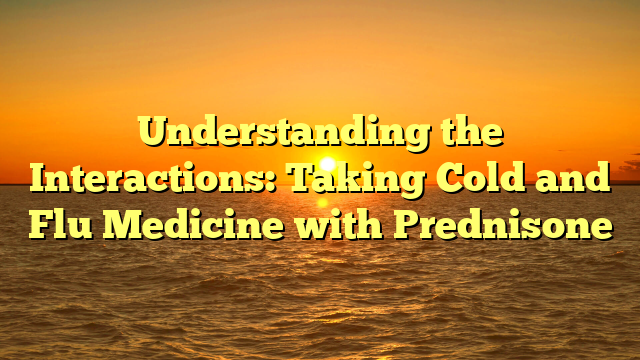Understanding the Interactions: Taking Cold and Flu Medicine with Prednisone
Introduction
When you’re suffering from a cold or flu, it’s common to reach for over-the-counter medications to alleviate your symptoms. However, if you’re also taking prednisone, a corticosteroid medication, it’s important to understand the potential interactions between these two drugs. In this article, we will explore the effects of combining cold and flu medicine with prednisone and provide some guidelines to ensure your safety and well-being.
What is Prednisone?
Prednisone is a synthetic corticosteroid that is commonly prescribed to reduce inflammation and suppress the immune system. It is often used to treat conditions such as asthma, allergies, and autoimmune disorders. Prednisone works by mimicking the effects of cortisol, a hormone naturally produced by the adrenal glands.
Common Cold and Flu Medications
There are various types of over-the-counter medications available to relieve the symptoms of cold and flu. These medications typically target specific symptoms such as congestion, cough, sore throat, and fever. Some common examples include:
- Nasal decongestants
- Cough suppressants
- Expectorants
- Pain relievers
- Fever reducers
Potential Interactions
While cold and flu medications are generally safe to use, combining them with prednisone can lead to potential interactions and adverse effects. Prednisone can enhance the effects of certain medications or interfere with their metabolism, leading to increased side effects or reduced effectiveness. It’s crucial to be aware of these interactions to avoid any complications.
Increased Risk of Gastric Ulcers
Nonsteroidal anti-inflammatory drugs (NSAIDs), such as ibuprofen and aspirin, are commonly used as pain relievers and fever reducers. However, when taken with prednisone, they can increase the risk of gastric ulcers and gastrointestinal bleeding. It’s advisable to consult your healthcare provider before combining these medications.
Reduced Immune Response
Prednisone works by suppressing the immune system, which can be beneficial in certain conditions. However, when combined with medications that also suppress the immune system, such as certain cough suppressants or antihistamines, it can further weaken your body’s ability to fight off infections. It’s important to choose cold and flu medications that do not have immune-suppressing properties.
Increased Blood Pressure
Decongestants, commonly found in nasal sprays and oral medications, can temporarily relieve nasal congestion. However, they can also raise blood pressure. When taken with prednisone, which can also increase blood pressure, the combined effect may lead to a significant rise in blood pressure. If you have hypertension or any cardiovascular conditions, it’s crucial to consult your healthcare provider before using these medications.
Guidelines for Safe Use
While it’s important to be cautious when combining cold and flu medications with prednisone, it doesn’t mean you can’t use them together. By following these guidelines, you can ensure your safety and minimize the risk of adverse effects:
- Consult your healthcare provider: Before starting any new medication, including over-the-counter cold and flu medications, it’s essential to consult your healthcare provider. They can provide personalized advice based on your specific medical history and current medications.
- Read the labels: Carefully read the labels of both the cold and flu medication and prednisone. Look for any warnings or precautions regarding potential interactions.
- Choose the right medication: Opt for cold and flu medications that do not contain ingredients that may interact with prednisone. For example, choose pain relievers that are not NSAIDs.
- Monitor your symptoms: Pay close attention to how your body reacts when combining these medications. If you experience any unusual or severe side effects, contact your healthcare provider immediately.
- Follow the recommended dosages: Stick to the recommended dosages of both medications. Taking higher doses than prescribed can increase the risk of adverse effects.
Conclusion
Combining cold and flu medications with prednisone can have potential interactions and adverse effects. It’s crucial to be aware of these interactions and follow the guidelines provided to ensure your safety and well-being. Always consult your healthcare provider before starting any new medications and closely monitor your symptoms. By taking these precautions, you can effectively manage your cold or flu symptoms while taking prednisone.
References
1. Mayo Clinic. (2021). Prednisone (Oral Route). Retrieved from https://www.mayoclinic.org/drugs-supplements/prednisone-oral-route/description/drg-20075269
2. National Health Service. (2019). Decongestants. Retrieved from https://www.nhs.uk/medicines/decongestants/
3. U.S. Food and Drug Administration. (2020). Nonsteroidal Anti-inflammatory Drugs (NSAIDs). Retrieved from https://www.fda.gov/drugs/drug-information-consumers/nonsteroidal-anti-inflammatory-drugs-nsaids











